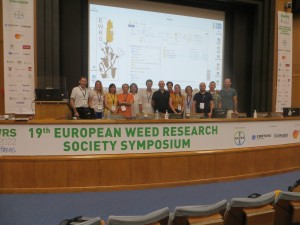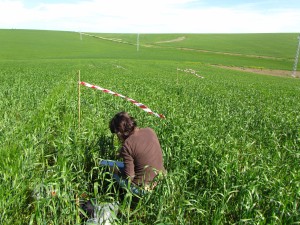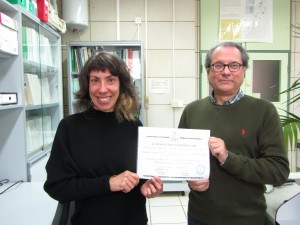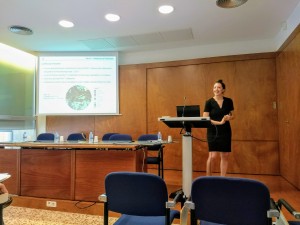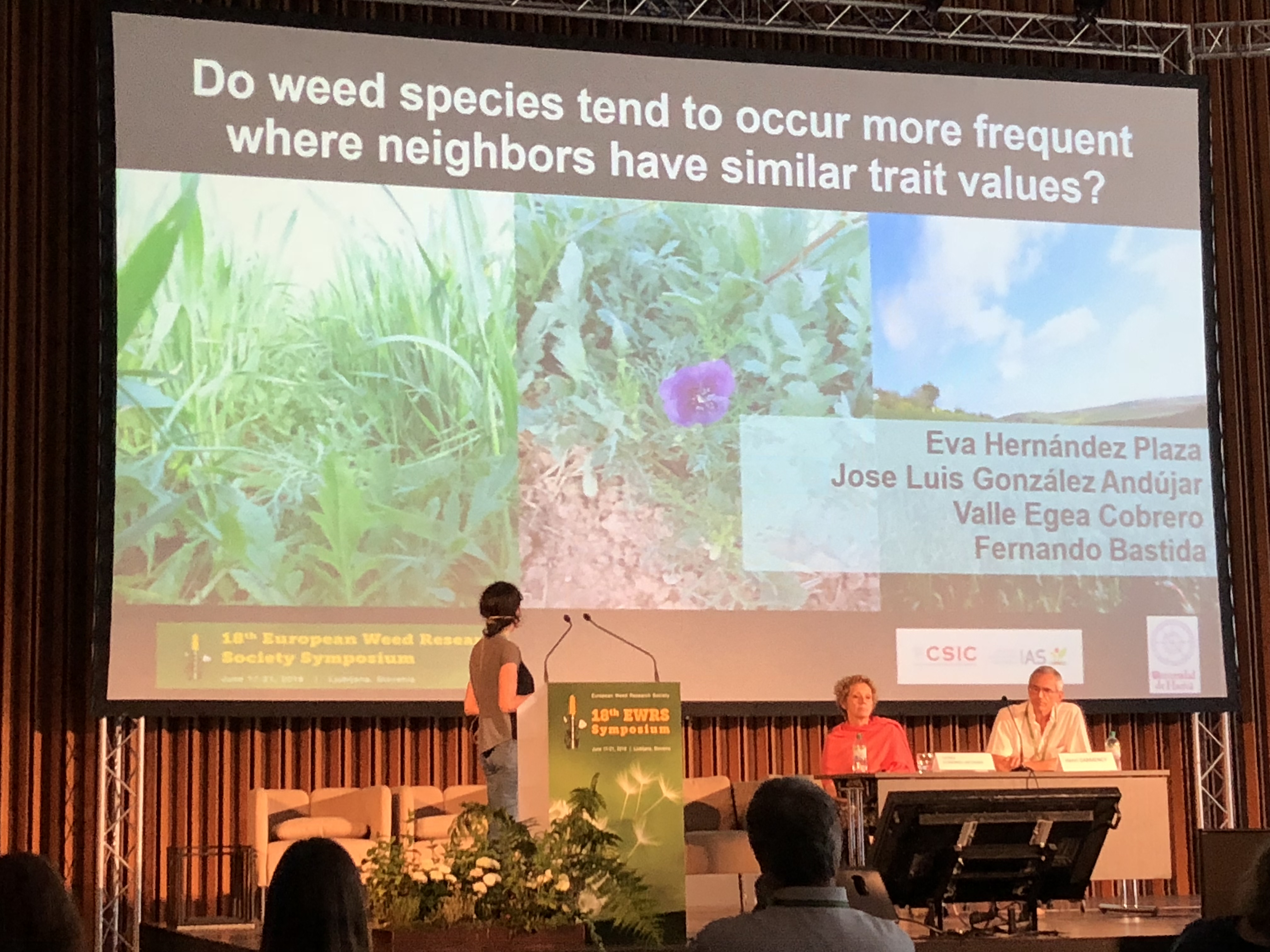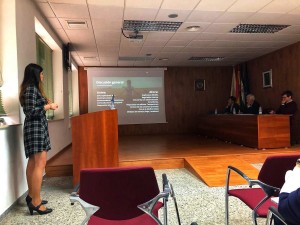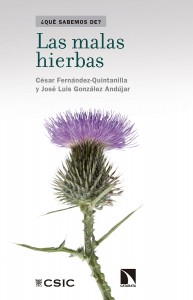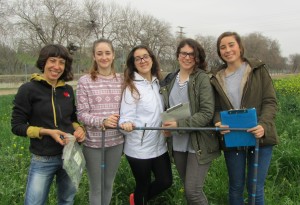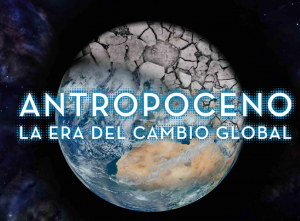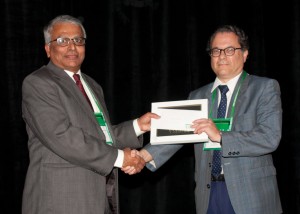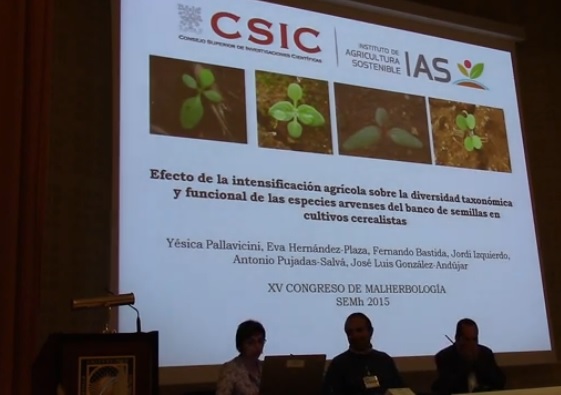___________________________________________________
The Weed Science Society of America (WSSA) has appointed Dr. José Luis González Andújar to the Editorial Board as Associate Editor of the journal Weed Science.
___________________________________________________
Dr. José Luis González Andújar delivered a guest lecture entitled “Weeds? Paradigm change in Weed Science” at the XIX Congress of the Spanish Society of Weed Science(SEMh) held in Beja (Portugal).
___________________________________________________
The Universidad Nacional del Sur in Argentina bestowed the title of Honorary Extraordinary Professor upon Dr. José Luis González Andújar. This recognition was granted to acknowledge his significant contributions to the field of Weed Science.
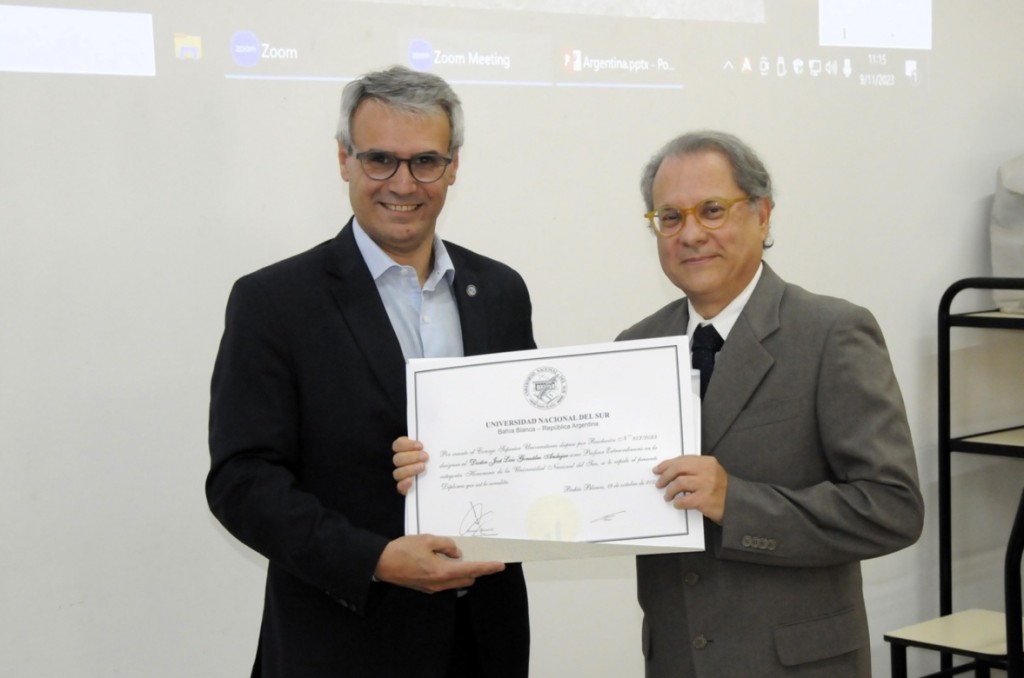 Dr. Juan Vega rector of the UNS (left) and Dr. José Luis González Andújar
Dr. Juan Vega rector of the UNS (left) and Dr. José Luis González Andújar
___________________________________________________
José Luis González-Andújar has participated in the 63rd Meeting of Weed Science Society of America (WSSA) held in Arlington (USA) in January 2023. He was invited by the WSSA as Fellow of the Society.
___________________________________________________
José Luis González-Andújar has participated in the 8th International Weed Science Conference held in Bangkok (Thailand) in December 2022. He was the Main Topic Organizer of the session on Modelling.
___________________________________________________
José Luis González-Andújar has participated in the 19th EWRS Symposium of the European Weed Research Society (EWRS) held in Athens (Greece) from 20-23 June 2022
___________________________________________________
Studying weed biodiversity in cereals (Click on the photo to watch the video):
___________________________________________________
José Luis González Andújar honored in the “Act in homage to the scientific staff of the CSIC” in recognition of his scientific merits during the academic year 2018-2019.
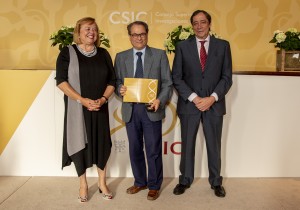 Rosa Menéndez, president of the CSIC; José L. González Andújar and the Secretary General for Coordination of Scientific Policy, Rafael Rodrigo.
Rosa Menéndez, president of the CSIC; José L. González Andújar and the Secretary General for Coordination of Scientific Policy, Rafael Rodrigo.
___________________________________________________
José Luis González-Andújar presenting the invited conference “Manejo Integrado de Malezas: Sistemas de soporte a las decisiones de manejo de malezas” at the XXIV Congreso Latinoamericano de Malezas (ALAM) 2019.
___________________________________________________
Eva Hernández Plaza and José Luis González-Andújar were awarded with the annual SEMh’s prize 2018 from the Spanish Weed Science Society for the work “Current status in herbicide resistance in Lolium rigidum in winter cereal fields in Spain: Evolution of resistance 12 years after”. This work was carried out in collaboration with INIA researchers.
___________________________________________________
Jane Morrison has presented the doctoral thesis entitled “Flowering native weeds for the conservation of wild pollinators in Agroecosystems”. The thesis has been co-directed by Drs. José Luis González Andújar and Jordi Izquierdo (Universitat Politécnica de Catalunya).
___________________________________________________
Eva Hernández Plaza presenting the work “Do weed species tend to occur more often where neighbors have similar traits values?” at the 18th Symposium European Weed Research Society (EWRS). The group presented a total of 5 communications:
- Mental modelling of European farmers’ decision making processes regarding Integrated Weed Management.
- IWMPRAISE – an EU HORIZON 2020 project on Integrated Weed Management.
- Pollinator attractiveness of five weeds in cereal systems.
- Do weed species tend to occur more often where neighbors have similar traits values?.
- Competitive ability and spatial aggregation of weed species in organic cereal fields in Spain.
___________________________________________________
Rosana Ferrero has presented the doctoral thesis entitled “Structure and stability of agricultural production in the face of climate change disturbance” qualified outstanding cum laude. The thesis has been co-directed by Drs. José Luis González Andújar and Mauricio Lima (Pontificia Universidad Católica de Chile)
___________________________________________________
José Luis González-Andújar has participated as scientific director in the International Meeting “Challenges of Plant Health to the Future: European Legal Framework and Climate Change” held in Valencia. He also gave an invited presentation entitled “Effect of climate change on the weed geographic distributions”. The meeting brought together thirty national and international experts to address two of the issues that will mark plant health in the future: the legal framework and the impact of climate change and more than 200 Plant Health professionals from different countries attended.
___________________________________________________
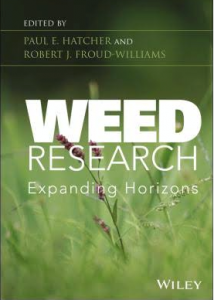 Jose Luis González Andújar has co-authored the book Weed Research Expanding Horizons.
Jose Luis González Andújar has co-authored the book Weed Research Expanding Horizons.
He has written the chapter 2: Seed Biology and Population Dynamics with Kirsten S. Tørresen, Laila M. Karlsson.
Seed biology is important for emergence in the field and for future weed infestations. This chapter focuses on seed biology, germination, dormancy and efforts in predicting weed emergence from seeds from a European perspective. It presents a brief overview of population dynamics in time and space, the factors influencing the dynamics and how population dynamics can be modelled. Emergence from the seed-bank starts with germination, pre-emergence growth and finally emergence. In addition to seeds, vegetatively propagated material is briefly mentioned. Dormancy influences under what conditions that germination can occur and regulates timing of germination. Population dynamics are important for understanding the whole system and are often based on the life-cycle of weeds: seed-bank, seedlings, adult plants, seed production and dispersal. Challenges in modelling emergence and population dynamics are large, due to differences between and within populations of species, variability in species response and there being many weed species in the same field with contrasting characteristics.
___________________________________________________________
Dr. José L. González-Andújar taught a course on “Introduction to the modeling of systems applied to decision-making in crop protection” at the University Nacional del Sur (Bahía Blanca, Argentina)
___________________________________________________________
Our group was awarded the with the ACTAS’s prize 2017 from the Spanish Weed Science Society (SEMh) for the work “The role of weeds in field margin in supporting wild pollinators in Mediterranean cereal Agrosystems”.
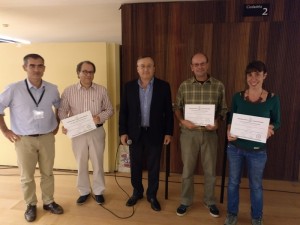 In the photo, Eva Hernández, Jordi Izquierdo and José Luis González-Andújar
In the photo, Eva Hernández, Jordi Izquierdo and José Luis González-Andújar
___________________________________________________________
El grupo de investigación participa en el proyecto europeo IWMPRAISE dentro del programa Horizonte 2020. Participan 41 entidades pertenecientes a 8 países: Dinamarca, Países Bajos, Reino Unido, Francia, Suiza, Eslovenia, Italia y España.
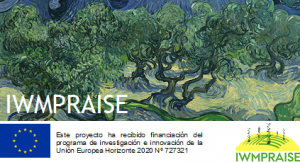 Dicho proyecto pretende demostrar que la adopción de técnicas de gestión integrada de malas hierbas (IWM) puedan ser aplicables a los sistemas de cultivo más representativos de Europa para mejorar la sostenibilidad agrícola, económica y medioambiental, creando sistemas de cultivo adaptados a un clima cambiante sin poner en peligro la rentabilidad y la producción agrícola. Nuestro grupo dirige el paquete de trabajo sobre cultivos perennes._
Dicho proyecto pretende demostrar que la adopción de técnicas de gestión integrada de malas hierbas (IWM) puedan ser aplicables a los sistemas de cultivo más representativos de Europa para mejorar la sostenibilidad agrícola, económica y medioambiental, creando sistemas de cultivo adaptados a un clima cambiante sin poner en peligro la rentabilidad y la producción agrícola. Nuestro grupo dirige el paquete de trabajo sobre cultivos perennes._
___________________________________________________________
Se ha publicado por el CSIC y la editorial Catarata el libro de divulgación ¿Qué sabemos de las malas hierbas? de César Fernández-Quintanilla y José Luis González Andújar. Con el libro se pretende dar a conocer al publico en general el amplio mundo de las malas hierbas.
Las malas hierbas han acompañado a la humanidad desde los inicios de la agricultura; son especies de plantas adaptadas a invadir y prosperar en hábitats alterados, de una forma u otra, por la presencia del ser humano. Hoy en día producen pérdidas económicas cuantiosas y se gastan miles de millones de euros en su control pues son capaces de interferir con las actividades humanas o, más específicamente, con los objetivos de ciertos sectores de la sociedad. A pesar de ser un componente habitual de nuestros paisajes agrícolas y su percepción negativa, existen muchos aspectos desconocidos de las mismas, como su profusión en la cultura o su papel en nuestra mesa. Pero ¿cuáles son las maldades y las bondades de estas plantas? ¿Cuál es el verdadero papel que juegan en nuestra sociedad y en nuestra cultura? ¿De qué medios disponemos para poder gestionar racionalmente sus poblaciones?
Disponible en: http://editorial.csic.es/publicaciones/libros/12874/0/las-malas-hierbas.html
___________________________________________________________
Nuestro grupo de investigación ha colaborado en el proyecto PIISA- SCIENCE IES 2017 de difusión de la investigación a los alumnos de Institutos de Educación Secundaria de Andalucía. Alumnas de 4º ESO y 1º bachiller han tenido la oportunidad de aprender a identificar especies arvenses en cereal y conocer la importancia de mantener su diversidad en los sistemas agrarios.
___________________________________________________________
Participación del grupo de investigación en la exposición Antropoceno: la era del cambio global. La exposición estará en las salas del Museo Nacional de Ciencias Naturales de Madrid desde el 13 de diciembre al 20 de abril 2017.
___________________________________________________________
Jose Luis González-Andújar was elected Honorary Member of the Weed Science Society of America (WSSA)
___________________________________________________________
José Luis González Andújar honored in the “act in homage to the scientific staff of the CSIC” in recognition of his scientific merits during the academic year 2014-2015.
 Dr. Emilio Lora Tamayo (President-CSIC) and Dr. José L. González Andújar
Dr. Emilio Lora Tamayo (President-CSIC) and Dr. José L. González Andújar
___________________________________________________________
Link para ver la presentación “Efecto de la intensificacion agrícola en la diversidad taxonómica y funcional de las especies arvenses del banco de semillas en cultivos cerealistas” de los autores Yésica Pallavicini, Eva Hernández-Plaza, Fernando Bastida, Jordi Izquierdo, Antonio Pujadas-Salvá y José Luis González-Andújar en el XV Congreso de Malherbología 2015 (Pulse aquí):
___________________________________________________________




